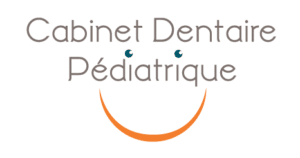Dental Care And Prevention For Your Baby
Our answers to the most frequently asked questions concerning your baby's oral health


Key Points
- The first baby teeth appear around the age of 6 months.
- Your pediatric dentist can offer you advice on managing teething.
- Encourage your child to start chewing their food as soon as their first tooth appears.
- First dental visits should be scheduled at the age of 2-3 years.
- Checkups should be scheduled every 6 months or, at minimum, once every year.
- Oral hygiene and diet are the keys to effective prevention.
- Limiting snacking in between meals is very important for your baby's oral health.
- Thumb (or pacifier) sucking should be prohibited after reaching the age of 12-16 months.
The Most Frequently Asked Questions Concerning Your Little One's Oral Health
- When should I schedule my baby's first dental visit?
- How often should my little one visit the dentist and why?
- What can I do to help my teething baby?
- How does diet affect my baby's health?
- How should I brush my baby's teeth?
- What toothpaste should I use for my baby?
- What are early childhood cavities?
- At what age should I put an end to my baby's thumb sucking and pacifiers?
- When should I schedule my baby's first dental visit?
- How often should my little one visit the dentist and why?
- What can I do to help my teething baby?
- How does diet affect my baby's health?
- How should I brush my baby's teeth?
- What toothpaste should I use for my baby?
- What are early childhood cavities?
- At what age should I put an end to my baby's thumb sucking and pacifiers?
When should I schedule my baby's first dental visit?
These professionals are called pediatric dentists, and are specially trained to treat children’s oral health. You should schedule your baby's first visit to a pediatric dentist between the age of 2-3 years to:
- learn the techniques of good oral hygiene and ensure that your child grows up with a beautiful smile
- checkup on your child’s growth and progress and take any preventative measures to address alignment issues of the teeth and jaws (occlusion).
Good oral hygiene, along with healthy dieting and habits are the keys to effective dental prevention.
How often should my little one visit the dentist and why?
You should schedule periodic checkups for your little one every 6 months or, at minimum, once every year, to monitor oral health and catch any cavities in early development. Baby teeth are actually more fragile because their enamel is less mineralized, making them more susceptible to attacks from acids and foods that then can cause rapid cavity development.
What can I do to help my teething baby?
The general baby teething schedule is as follows:
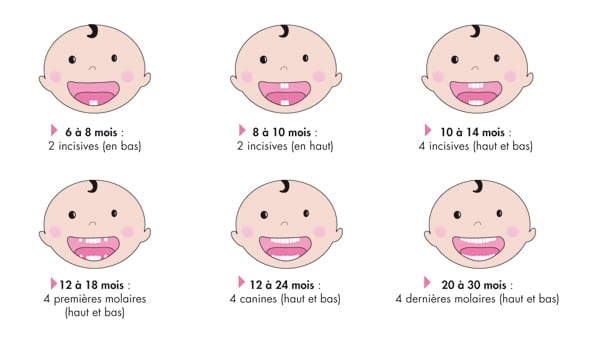
The first baby teeth appear around the age of six months and can be accompanied by a swelling of the gums, reddening of the gums or cheeks, crying, drooling, fever, loss of appetite, and sometimes diarrhea.
Fortunately, there are ways of alleviating the pain your child is experiencing:
- Giving your baby a refridgerated teether to chew on
- Massaging the swollen area with an appropriate product (found in pharmacies) or a baby toothbrush
- Giving your baby paracetamol in the dose indicated for their age

Massaging your baby in general, as often as possible, can be very helpful: talking to them about their hands, feet, arms, and stomach;
helping your baby understand that it's their very own body.
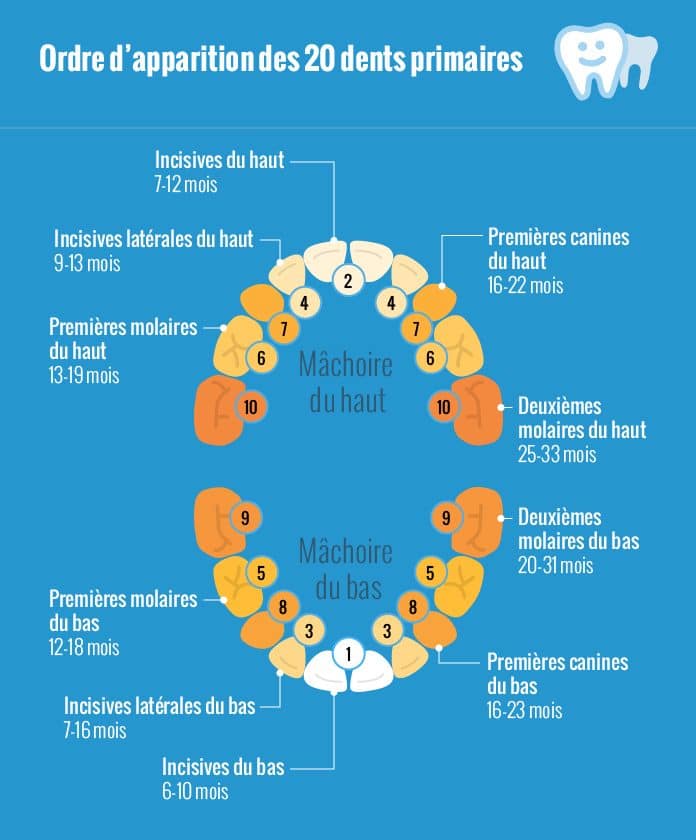
How does diet affect my baby's health?
The appearance of your child’s first tooth marks the beginning of their progression from suckling to being able to chew solid foods with their teeth.
Small bits of food will trigger your baby’s natural instinct to chew, and you can introduce bigger and bigger morsels, of increasingly more solid foods, as the number of your baby’s teeth increases.

- Favor organic foods, which contain more vitamins and minerals.
- Introduce solid foods (instead of compote, purée, etc.), once the first tooth makes its appearance, in order to stimulate healthy tooth and jaw development.
- Favor gluten free foods before the age of 1 year.
- Don't add white sugar to meals or snacks.
- Avoid fruit juice before the age of 3. These are very acidic and can make tooth enamel fragile, in addition to the excess sugar they bring. Favor smoothies, where the presence of fruit fiber facilitates sugar digestion.
- Control snacks between meals. Baby teeth are more fragile, and the constant exposure to acids throughout the day leads to cavity development.
How should I brush my baby's teeth?
Before your baby gets their first tooth, you can start by cleaning your baby's gums with a moist cotton ball! Then, you can brush without toothpaste, at morning and at night. Little by little, this becomes regular practice, just until your child starts to brush for themselves.

Be sure to brush all surfaces of the teeth, and don't forget to massage the gums. It's not necessary to brush hard, but it is necessary to brush for a long time in order to loosen all the plaque. Continue to assist and monitor your child’s brushing until they reach 8 years old!
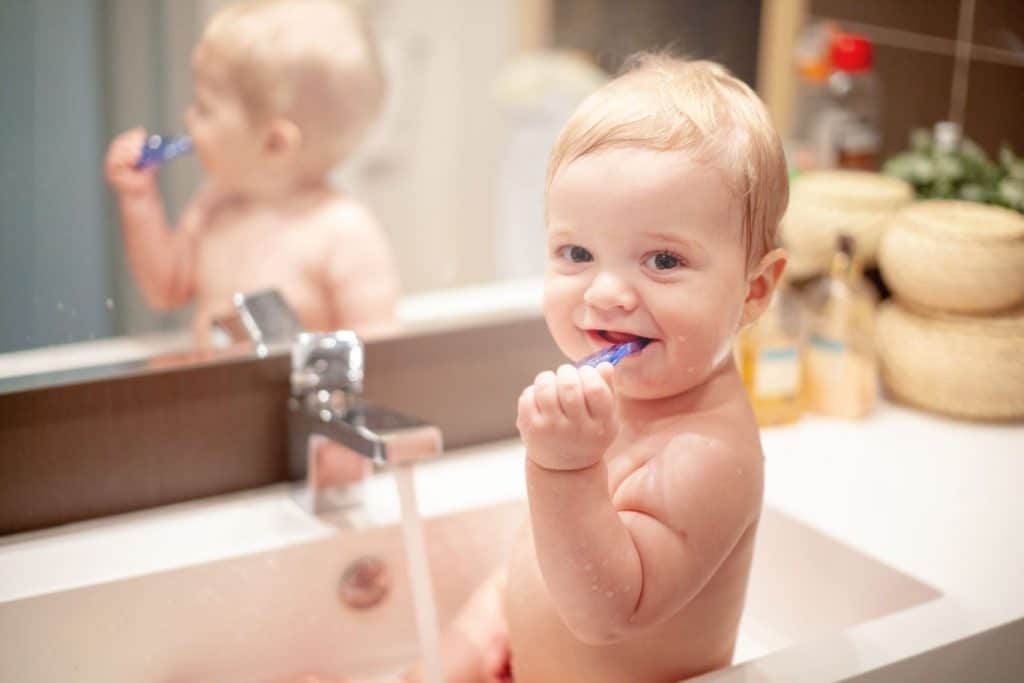
Baby Oral Hygiene Essentials
- Wash your baby's gums with a moist cotton ball before bed.
- Once your baby's first tooth appears, brush without toothpaste, at morning and at night.
- Start brushing with toothpaste (an amount the size of a pea) after your baby reaches 16 months.
- Brush your baby's teeth with a fluoride toothpaste that has a fluoride concentration appropriate for your baby's age.
- Continue to assist and monitor your child's brushing until they are at least 8 years old!
What toothpaste should I use for my baby?
Start brushing your baby's teeth with toothpaste at the age of 16 months, applying an amount equal to the size of your child’s pinky nail (or a pea). Brush your baby’s teeth with a fluoride toothpaste that has a fluoride concentration less than 1000 ppm and appropriate for their age. Once your baby reaches 2 years old, the recommended fluoride concentration is between 1000-1450 ppm. Then, after the age of 6, your child can use adult fluoride toothpaste.
What are early childhood cavities?
Early childhood cavities are very aggressive form of tooth decay that affects baby teeth in children 5 years and under. Children can quickly find themselves in a situation where they have cavities on every tooth. Therefore, it’s important to monitor your baby for symptoms of cavities such as pain, loss of appetite, hypersensitivity, temperature fluctuations, as well as their sugar intake.
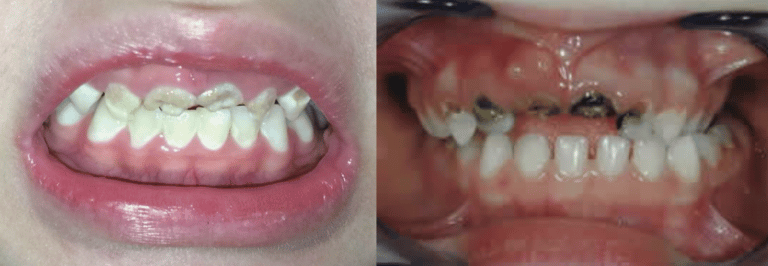
Early childhood cavities are sometimes referred to as baby bottle tooth decay because they can arise from the fact that infants often fall asleep with a bottle in their mouth or while suckling. However, more generally, early childhood cavities occur in situations where the baby’s mouth, gums, and teeth aren’t regularly cleaned after meals. Early childhood cavities can therefore be caused by the bottle, but they can also arise when the baby is breastfed, or regularly consumes fruit juice or snacks (bread, fruit, etc.) throughout the day. Residues from milk or food as well, when kept for long periods in the mouth, keep sugars in contact with tooth surfaces where they transform into acids and attack the teeth.
Early childhood cavities can also be caused by cariogenic bacteria. Children aren’t born with cariogenic bacteria in their mouths- it is transmitted to them by adults (in particular when adults themselves have untreated cavities).
To help your baby avoid early childhood cavities:
- Never put your baby's spoon in your own mouth.
- Clean your baby's gums and teeth before putting them to bed.
- Regularly examine your baby's teeth by lifting their upper lip.
- Schedule regular checkups with your pediatric dentist.
At what age should I put an end to my baby's thumb sucking and pacifiers?

At all ages, it’s recommended to limit thumb sucking and pacifiers to bedtime and naptime in order to prevent problems with your baby’s teeth and jaw development. You should then completely put an end to all thumb sucking and pacifiers before your baby reaches the age of 12–16 months.
Why?
- Thumb sucking and pacifiers force and habitualize a lower positioning of the tongue that can cause anormal swallowing (normally, the tongue is raised and adheres to the palate when swallowing or resting).
- Prolonged sucking on fingers, pacifiers, or comforters can also modify the morphology of the palate which, in response to the constant sucking, will progressively adapt its curvature, developing into an ogival-type palate.
- Prolonged sucking can additionally cause tooth displacements and malocclusions.
- Outside of structural development, your child can also develop pronunciation difficulties (a lisp, for example, amongst others).
What can we do?
The pediatric dentist will check several factors: that your child breaths well through their nose with their mouth closed; that their tongue is well positioned against the palate; and that thumb sucking and pacifiers start to be forgotten at the appropriate time.
If habits have already manifested problems, the pediatric dentist can suggest treatment through functional dentistry to encourage harmonious jaw growth and avoid more serious orthodontic treatments at adolesence.
